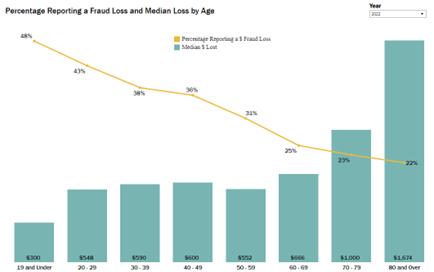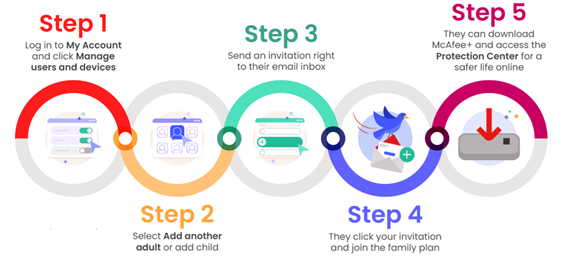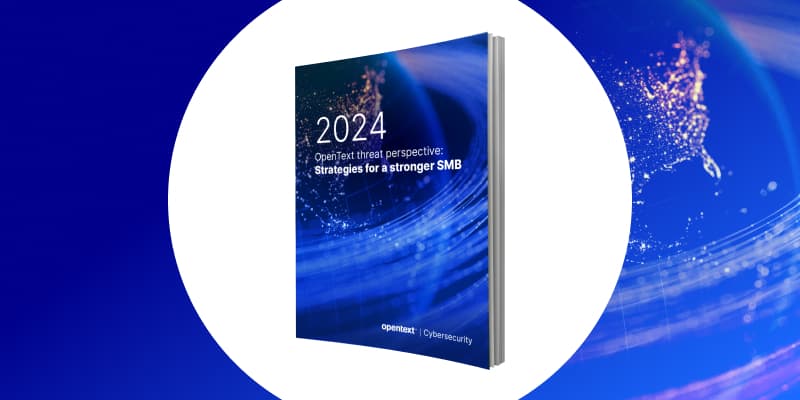
As
people
get
into
their
70s,
they
stand
to
lose
more
to
fraud
than
any
other
age
group—which
makes
a
strong
case
for
protecting
the
older
people
in
our
lives.
If
you’re
looking
to
protect
them
online,
you
have
several
ways
to
go
about
it.
Our
new
McAfee+
Family
plans
are
one
way,
where
two
adults
and
four
children
get
personalized
online
protection
that
they
can
set
up
and
manage
on
their
own.
With
your
McAfee+
Family
plan
a
simple
invitation,
you
can
rest
easy
that
they’re
protected
against
online
scams
and
other
threats.
And
threats
certainly
face
us
all,
and
hit
older
adults
hardest.
In
the
following
table
courtesy
of
the
U.S.
Federal
Trade
Commission
(FTC),
you
can
see
the
risks
that
adults
faced
in
2022.
While
younger
victims
reported
fraud
loss
at
a
higher
rate,
their
median
losses
were
typically
smaller
than
the
losses
of
older
adults.
By
the
time
victims
reach
their
70s
and
80s,
the
reporting
rate
dropped,
yet
the
median
losses
made
a
significant
leap.

Note
that
these
are
reported
cases
of
fraud,
and
those
reported
to
the
FTC.
In
other
words,
this
represents
just
a
slice
of
the
fraud
that
occurred
in
2022.
Moreover,
as
we’ve
shared
before
in
articles
about
elder
scams,
older
adults
may
be
less
willing
or
able
to
report
a
scam.
The
reasons
vary.
They
may
not
know
how
they
were
scammed
or
they
may
feel
shamed
by
being
scammed—all
of
which
can
lead
to
underreporting.
Moreover,
not
every
scam
report
includes
an
age
range,
which
leads
to
further
underreporting.
Yet
the
case
is
clear.
Scams
pose
a
significant
threat
to
older
adults.
Which
online
scams
are
targeting
grandparents
and
older
adults?
Looking
further
into
the
FTC
data,
older
adults
in
the
U.S.
lost
more
than
$1.6
billion
to
scams
in
2022
across
four
primary
categories:
-
Imposter
scams
–
As
the
name
implies,
these
involve
scammers
masquerading
as
legitimate
businesses,
government
agencies,
or
even
friends
and
family
members.
Regardless
of
the
guise,
the
scammers
want
the
same
thing—to
steal
money
and
personal
information
from
the
victim.
To
do
so,
scammers
may
make
phony
threats
as
they
pose
as
credit
card
agents
or
tax
collectors,
or
they
may
pretend
to
be
a
friend
or
grandchild
in
urgent
financial
need.
In
these
cases,
email
and
social
media
account
for
primary
contact
methods,
and
payments
usually
take
the
form
money
orders
and
gift
cards
as
losses
from
them
are
difficult
to
recover.
-
Online
shopping
scams
–
These
scams
take
in
victims
of
all
ages.
Search
and
social
media
ads
lead
victims
to
bogus
websites
that
sell
unique
or
hard-to-get
items,
often
at
a
greatly
reduced
cost.
However,
once
the
scammers
receive
payment,
they’ll
either
deliver
low-quality
knockoff
goods
or
no
goods
at
all.
In
the
case
of
counterfeit
goods,
these
scams
may
be
a
front
for
illegal
activity
and
may
exploit
child
labor
as
well.
In
the
case
of
non-delivery,
organized
cybercrime
groups
often
run
these
scams,
operating
them
much
in
the
same
way
a
legitimate
business
sells
its
goods—with
marketing
teams,
web
developers,
and
processes
for
receiving
payment.
In
short,
they
can
look
and
act
rather
sophisticated.
-
Sweepstakes
scams
–
Tough
to
win
a
sweepstakes
that
you
never
entered.
But
that
won’t
stop
scammers
from
saying
you
have.
Victims
will
get
an
email
or
a
direct
message
in
social
media
saying
that
they’ve
won
a
prize
and
that
all
they
need
to
do
it
claim
it.
This
is
where
the
scammer
will
ask
the
victim
to
provide
something,
like
personal
information
because
the
scammer
needs
it
determine
their
“eligibility”,
or
their
bank
account
routing
information
so
that
the
scammer
can
“send
the
winnings.”
In
some
cases,
they
may
outright
ask
victims
for
money,
like
a
processing
fee
or
a
payout
for
taxes
on
the
(bogus)
winnings.
-
Tech
support
scams
–
These
scams
target
older
adults
several
ways,
such
as
through
links
from
unsolicited
emails,
pop-up
ads
from
risky
sites,
or
by
spammy
phone
calls
and
texts.
Here,
the
scammer
will
pose
as
tech
support
from
a
known
and
reputable
brand
and
inform
the
victim
that
they
have
an
urgent
issue
with
their
computer
or
device.
While
the
device
is
actually
in
fine
working
order,
the
scammer
offers
to
“fix”
it
for
a
fee.
With
permission
to
fix
the
device
given,
the
scammer
either
does
nothing
or,
more
maliciously,
installs
malware
like
adware
or
spyware
on
the
otherwise
healthy
device.
Helping
the
grandparents
and
older
adults
in
your
life
avoid
online
scams.
So
many
scams
fail
to
pass
the
sniff
test.
The
moment
you
scrutinize
the
incredible
offer
plastered
on
that
ad
or
question
why
a
so-called
tax
collector
would
hound
you
on
social
media,
something
immediately
smells
fishy.
Yet
people
don’t
always
catch
that
whiff.
People
of
all
ages.
Not
just
the
elders
in
our
lives.
One
way
we
can
help
everyone
stay
safer
online
is
through
conversation.
The
knowledge
that
comes
from
a
good,
ongoing
conversation
about
life
online
provides
them
with
one
pillar
of
protection.
Talking
about
how
they
spend
their
time
online
and
the
types
of
scams
that
are
out
there
arms
them
with
the
savvy
they
need
to
spot
a
scam.
That
will
help
them
take
that
crucial
moment
when
faced
with
a
possible
scam,
a
crucial
moment
to
consider
if
that
ad,
email,
or
direct
message
is
indeed
bogus.
The
second
pillar
comes
from
comprehensive
online
protection.
Today’s
protection
goes
far
beyond
antivirus.
It
protects
devices
the
privacy
and
the
identity
of
the
people
using
them.
In
the
case
of
our
McAfee+
Family
plans,
they
protect
up
to
six
people
from
viruses,
credit
card
fraud,
and
identity
theft
with
tailored
guidance
as
they
do
what
they
do
online.
With
an
elder
on
your
family
plan,
you
can
see
which
devices
they’ve
installed
protection
on,
so
you’ll
know
they’re
protected.
More
specific
to
some
of
the
scams
we
talked
about,
it
can
help
block
older
adults
from
accessing
messages.
Further,
it
can
help
prevent
scam
calls
and
texts
in
the
first
place.
Personal
Data
Cleanup
spots
and
removes
their
personal
info
from
risky
data
broker
sites
that
spammers
use
to
find
victims.
And
if
their
personal
information
has
been
compromised,
our
identity
monitoring
alerts
them
if
their
data
is
found
on
the
dark
web,
an
average
of
10
months
ahead
of
similar
services—and
get
expert
guidance
about
what
to
do
next.
Our
identity
theft
protection
and
recovery
service
identity
and
credit
if
the
unexpected
happens
to
them.
<h2>Adding
a
parent
to
your
family
plan.
Adding
someone
to
your
McAfee+
Family
plan
is
practically
as
simple
as
typing
in
an
email
address.

Think
of
it
as
sending
an
invitation,
one
where
everyone
gets
their
own
personalized
protection
with
their
own
unique
login.
This
way,
each
member
of
the
family
can
set
up
and
manage
their
own
protection
for
their
identity,
privacy,
computers,
and
phones.

With
this
invitation,
they’ll
see
that
it
comes
from
you
and
that
all
they
need
to
do
to
start
their
protection
is
to
click
the
link—no
extra
charges
or
fees.
They’re
simply
part
of
your
plan
now.
From
there,
they
can
download
their
protection,
set
up
their
devices,
and
consult
their
McAfee
Protection
Score
to
see
how
secure
they
are.
Then
simple
instructions
make
it
easy
to
set
up
and
fix
gaps
to
improve
their
online
security
so
that
they’re
safer
still.
In
all,
it’s
a
highly
straightforward
process,
for
you
and
members
of
your
family.
Protect
your
family
from
scams
online
with
the
right
plan
in
place.
Spending
any
time
online
calls
for
online
protection,
no
matter
what
age
you
are.
While
threats
may
look
different
across
different
age
groups,
every
family
member
faces
them.
Another
thing
everyone
has
in
common
is
that
every
family
member
can
protect
themselves
from
threats,
far
more
thoroughly
now
than
before.
Comprehensive
online
protection
has
evolved
far
beyond
antivirus.
It
protects
the
person,
which
is
important
because
that’s
who
scammers
target.
They
target
people,
so
they
can
invade
their
privacy,
steal
their
personal
information,
or
simply
rip
them
off.
Put
plainly,
knowing
what
today’s
scams
look
like
and
using
comprehensive
online
protection
offer
a
one-two
punch
in
the
defense
against
online
scams.
You
have
several
options
to
get
it
for
the
older
adults
in
your
life,
our
new
McAfee+
Family
plans
being
one
of
them.
Whichever
route
you
take,
putting
your
family’s
protection
plan
in
place
will
absolutely
reduce
the
chances
of
someone
you
love
getting
stung
by
a
scam.






